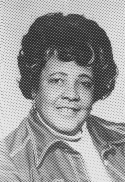Page 26
[Begin Tape 1, Side A]
Currie: Are you ready to start again?
Payne: Yes. Fire when ready!
Currie: I was thinking that last time, we talked about when you went to Japan after World War II, but we didn't talk about the impact World War II had on you and your family.
Payne: My brother served in World War II, in the European theater. So it did have some impact, yes.
Currie: Were you working in the library during the war?
Payne: Yes. There were many young men from our community who were drafted and went off to war. Some died. That, naturally, was a traumatic period, particularly since the armed forces were still segregated. So it was not a good feeling. We did not have that much enthusiasm for war. We weren't flaming patriots. But we didn't have any draft dodgers, except one instance. There was one fellow who challenged it, and he made such an issue of it that they decided it would be better not to take him in, because he had a very strong influence on other persons. He laid down all the legal cases, the legal parameters for not signing up. He said that he challenged them on the issue of his race because he was of mixed blood. [Laughter.] So they got into a real donnybrook about it. Finally, I guess, they just decided to give up.
Currie: How did he challenge them because he was of mixed blood?
Payne: Well, on the forms that you had to supply, he refused to put down Negro, because he said he had Italian, he had Irish, he had Indian blood: "Now, which one of these do you want?" Privately, he was not disowning being black, but he did that. He was of that mind, and he confused the Selective Service Board. So he actually got away with it. I don't think he ever served any time.
Currie: I noticed on some of your résumés—and we didn't talk about this—you mentioned having attended Northwestern University.
Payne: Medill School of Journalism. Evening classes.
Currie: I see. Was this before you went to Japan?
Payne: Yes. This is back in 1940.
Currie: Oh, I see. How did you decide to do that?

